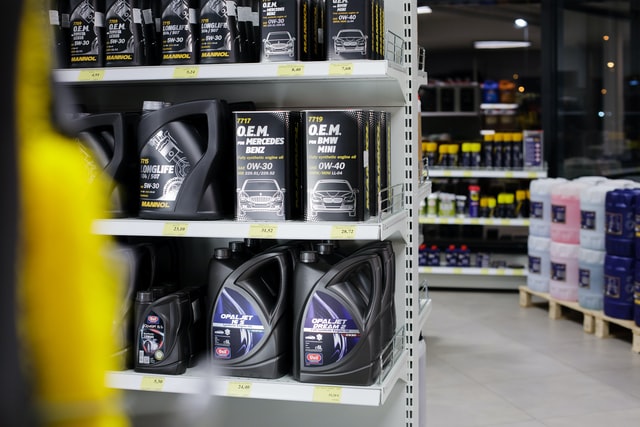Engine oil is a crucial component in maintaining the performance and longevity of your car’s engine. Without it, the engine’s moving parts would grind against each other, leading to friction, wear, and tear. In addition to lubricating the engine, oil also helps to remove contaminants and debris that can accumulate over time, which can lead to clogging and engine damage.
However, it’s important to keep in mind that engine oil has a limited lifespan and needs to be changed at regular intervals as recommended by the manufacturer. Failure to do so can lead to decreased engine performance, decreased fuel efficiency, and even engine failure.
Choosing the right engine oil for your car can be a daunting task, but it’s important to consider several factors when making your decision. First and foremost, you should refer to your car’s owner’s manual to determine the type of oil recommended by the manufacturer. This information will include the oil’s viscosity and performance specifications, which should be adhered to for optimal engine performance.
Additionally, you should consider the driving conditions you typically encounter. For example, if you frequently drive in extreme temperatures or harsh conditions, you may need an oil that provides better protection against wear and tear. Conversely, if you mostly drive in mild conditions, a standard oil may suffice.
It’s also important to choose an oil from a reputable brand and to ensure that the oil meets the industry standards set by the American Petroleum Institute (API) or the International Lubricant Standardization and Approval Committee (ILSAC).
By taking these factors into consideration and adhering to the manufacturer’s recommendations, you can ensure that you choose the right engine oil for your car, which will help to keep your engine running smoothly and efficiently for years to come.

[ Best Hydraulic Oils for Tractors ]
Browse our content
How often should you change the engine oil for your car?
This depends on the engine oil you use for your car and how often you drive the car (car mileage). Engine lubricants have advanced, and unlike before, car owners were recommended to change the oil after just 3000 miles of the drive. Some oils can last for up to 7000 miles. Again, this depends on your car model and the oil you use. Other car engine oil brands recommend changing the lubricant after one year for people who drive their cars for less than 6000 miles.
Why is it crucial to change the car engine oil?
To safeguard the car
The engine is like the heart of the car, and if it is not functioning well, then your car will shut down. This occurs mainly if the oil has stayed for long without changing. Engine oil is bound to get old, whereby it ends up breaking down due to dust, dirt, and other contaminants. So, once the oil breaks and gets contaminated, your engine will not function smoothly and may end up overheating resulting in the car shutting down. This leads to high repair costs, something you can avoid by religiously changing the oils of your engine.
To regulate fuel consumption
Changing the oil of your engine will highly impact your gas usage positively. Changing oil means that your engine will continually function smoothly. The efficient moving of the engine effortlessly increases its performance without the need to use a lot of gas. If the engine has poor performance, your car will use a lot of gas to fuel the engine to move.
How to you choose the right engine oil for your car?
There are a lot of engine oil brands to choose from, but how do you narrow it down to the perfect one for your car. Here is the guide to help you choose the right engine oil for your vehicle.
Your car
The first thing you need to consider is the car model and series. This is crucial because, as we all know, new car models with advanced engines and moving features are being invented. Someone who owns such an upgraded car will need advanced engine oil to match up with the intensity of the engine. The good thing is that engine oil manufacturers indicate the engines are suitable for the different oils. So, use the car model and series to help you buy the right oil for your vehicle’s engine.
The temperature changes
The other thing to consider is the temperature change in your region. Generally, cold temperatures will make the engine oil thick, reducing its flow. In contrast, the hot temperatures increase the thin consistency of the engine oil for easy running to lubricate the engine. But the Bottom line is, as much as the change of temperature may not affect the engine oil that much in functioning, it is safe to choose the oil that is not affected by climate changes. This takes us to the next consideration, the engine oil type.
The type of engine oil
The engine oil is classified into two groups which are the convectional or mineral oils and the synthetic oils. The difference between these two oils is durability and functioning.
- If you are looking for engine oil that will efficiently lubricate your engine, mineral oils do a great job. Still, synthetic oils are equipped with chemicals and thermal stability to enable the engine to withstand a lot of things.
- Mineral oils are easily affected by climate changes, whereby they adjust to a more solid form in cold seasons and a more liquid form in hot seasons. But this does not affect the functionality of the oils that much. However, when it comes to synthetic oils, you don’t have to worry about these oils changing in any temperature regulation in surroundings, one of the reasons the old is more powerful.
- Synthetic oils are more durable as you can go many miles without changing the oils in between. But, conventional oils have a high expiry time as these types of oils are bound to trap dirt and other impurities easily.
- Lastly, if you are looking for affordable engine oils, I would advise you to go for mineral engine oils since synthetic ones are quite pricey.
Your car mileage
This narrows down to how old your car is since the mileages remaining in your car will determine the kind of oil your engine needs. The higher the car’s mileage, the more refined and durable the oils should be to handle the car mileages. So, if the engine oil is for a new car model, you may need to consider getting synthetic engine oil since it is more economical for you, and the efficiency can match the engine’s functioning. Such cars usually have hundreds of thousands of mileage remaining. For cars with thousands of miles remaining, go for convectional oil as the car is also not that active.
Where you drive/location
Funny enough, people who tend to drive for long distances are better off than people who make short trips around the city, which impacts the engine negatively. There are a lot of traffic and stops when driving in the city, and the constant stopping and restarting of the engine will take a toll on it. Another thing is people who make short trips probably when only going to work or to run errands.
Your engine is underperforming, and if it stays for long without the oil being used, it may trap dirt, dust, and other debris that may require you to change the oil often. So, if you live in the city and make short driving trips, go for quality synthetic oils to avoid this.
What engine oil does your engine use?
Does your car use diesel or petrol fuel? Of course, the kind of fuel the engine is manufactured to use will help you buy the right engine oil. You cannot use engine oil for a diesel car in a petrol engine as it can cause a breakdown.
The standard certification
Another crucial factor to check out when buying engine oil is if it is certified. In most cases, engine oils have to be checked by more than two authorities before being certified to be safe to use on can engines.
* Some of the verifications checked are if the car engines to sue with the oils are well indicated and safe.
* The oils are tested to review the content used in making it for safety purposes
* Another organization will check if the oil has the standard weight for the given packaging.
So, before buying any oil brand, check out these three certifications to make sure you are buying quality and the right oils for your car engine.
The durability
As much as the car also determines the kind of oil to buy, you should also consider the power of the oil. Some oils require changing between 3000 to 7000 miles, and others may last for up to 10,000 miles. Who wants to change their engine oils after just 3000 miles? It is expensive and time-consuming as well. So, if you can afford it, always choose oils that take up to 10,000 miles of the drive before changing.
ACEA rating
This is a crucial factor to consider when choosing an oil, mainly for vehicles fueled with diesel. ACEA rating is done to determine the lubricating capacity of the engine, and this will guide you in choosing the perfect oil that can handle your engine. The ACEA rating is measured using the ludge ear, soot thickening, oxidative thickening, etc. The ratings are given in the form of A3, B5, A3, and B4, to name a few. Keep these details in mind to guide you in choosing engine oil that matches.

Summary
To know the right engine oil for your car, you first need to know your car model, everyday driving needs, location, and temperature range. This article has outlined all the factors you need to consider when buying your car engine oil. Always go for oil that will last longer before needing to change it and that is not prone to trapping dust and other dirt impurities.
If it is your first time buying the oil, seek help regarding which the best engine oil will work for your car. If you choose between synthetic and mineral engine oils, always go for synthetic oils. The synthetic engine oils are durable and not prone to quick wear.